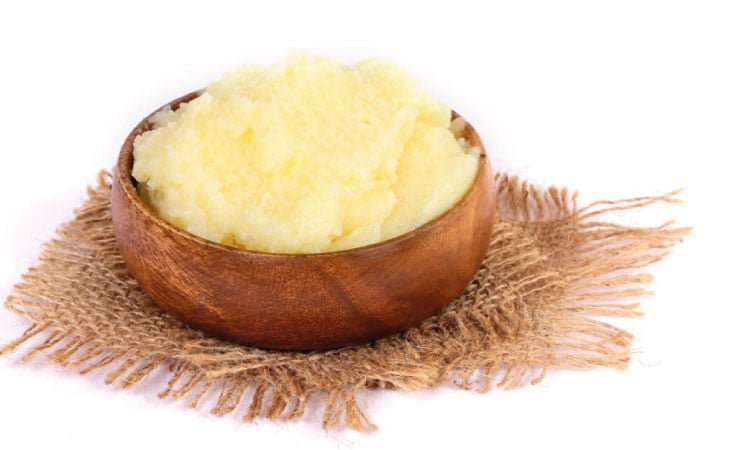Pregnancy calls for a well-balanced and nutritious diet for both the mother’s and baby’s well-being. While you may have earlier never bothered about flavoring your food with butter, you may now actually be wondering if eating butter is safe during pregnancy. Layering with a toasted bread slice with butter may seem like just a normal everyday thing, but now that you are pregnant, you want to be sure.
Totally, because pregnancy is a period where caution is better than cure.
Is It Safe To Eat Butter During Pregnancy?
Eating butter during pregnancy does have a lot of health benefits, provided moderation is followed. It may not suit all pregnant women though, especially those who are lactose intolerant or allergic to butter and butter products.
However, you may wish to avoid it for other reasons such as if you are obese and width not to consume anything that contains high calories. During pregnancy, butter may also be off-limits for you is you have gestational diabetes.
Salted Or Unsalted Butter During Pregnancy?
While I’d go for unsalted butter anyday because it is the purest form of butter offering a great taste, some people prefer salted butter in their food. The salt does make a dish more flavoursome and if you are sautéing, frying, making a toast or scrambling eggs, it tastes much better with salted butter.
Salt also acts as a preservative and that is why the shelf life of salted butter is more than the shelf life of unsalted butter.
Having said that, you should note that consuming salted butter will increase your sodium intake which can cause pregnancy complications if you have hypertension already. Let your taste guide you when you eat butter during pregnancy, but make sure that you have more of unsalted, fresh ‘makhan‘ prepared at home to add to your food.
Remember, butter is high on calories but low on other essential nutrients such as fiber, calcium, magnesium and potassium. Both salted and unsalted butter have about 714 calories per 100 grams of serving.
Related Reading: 21 Pregnancy Superfoods To Include In Your Pregnancy Diet
Calculate Due Date With LMP
What Are The Health Benefits Of Eating Butter During Pregnancy?

Consuming butter during pregnancy is quite a good thing provided you exercise moderation. Butter is about 80% fat and the rest of the composition is mostly water. It offers more than 400 different fatty acids along with a good amount of vitamins A, D, E, B12 and K2. Some health benefits associated with eating butter are:
1. Provides instant energy
A little butter goes a long way to provide energy and help you achieve more from a day. Pregnancy is a tough job and can make you tired and low on energy. Counter this by having some butter and feel a spike in your energy levels.
2. Helps in development of baby’s bones and teeth
Calcium in butter can aid in the development of baby’s bones and teeth. Make sure to have calcium rich foods in your diet because otherwise your baby will take it from your bones which isn’t too good in the long run.
3. Butter is healthy for skin
Skin issues during pregnancy can leave you feeling distressed. Counter these by eating butter as butter has vitamin E and other antioxidants that boost skin health making it glow and shine. It also boosts skin elasticity. Don’t overdo though, lest you get adversely effected in the longer run.
4. Helps with building muscles
Butter helps in building muscles in the growing baby thanks to all the good fats that butter provides. For a healthy baby, consuming moderate amounts of butter is actually a good thing to do.
5. Aids in developing baby’s brain
Have you ever wondered why our parents keep asking us to eat makhan and butter? Well, this is because butter aids better brain function and improved brain activity, thanks to Arachidonic Acid (AA) present in it. There was a reason why makhan was associated with higher grades! More on foods to eat during pregnancy to have an intelligent baby here.
6. Boosts immunity
Vitamin A plays a critical role in enhancing immunity and promoting good eye health, proper growth and development and protecting the body from infectious diseases. Who wouldn’t need a better and stronger immunity during pregnancy?
7. Promotes metabolism
Butter contains lecithin, basically an emulsifier that helps in cutting bad fats with good fats and thus assimilates the same. It also has positive effect on metabolism and may inturn help you lose weight. Lecithin also improves digestion.
8. Good for joint pains
Our desi white makhan has a molecular structure that assimilates fat and lubricates the joints. This helps in keeping joint pains away.
Related Reading: 7 Home Remedies For Leg Cramps During Pregnancy
How Much Butter Can I Eat When Pregnant?

Moderation is the key to eating anything during pregnancy. A ½ teaspoon of unsalted butter to go with your paratha should be good. If you are using it on toasted bread, don’t use it when the bread id hot because that way one ends up adding more butter than required. Use a thin layer when the bread has cooled down. As a thumbrule, you should not eat butter, salted or unsalted everyday as it will increase your weight as well as your cholesterol levels.
Eating butter during first trimester of pregnancy
First trimester of pregnancy is quite a testing time for many to-be-moms. Battling nausea, fatigue, hormonal changes etc. can take a toll on your mental health and physical well-being. Do not hesitate to flavor your food, whatever little you are able to gulp down with a little butter now and then. Plus, it twill address energy issues and pass on some crucial nutrients to the growing baby.
Eating butter during second trimester of pregnancy
Now that you are more settled, eating butter during second trimester of pregnancy should be a careful choice. Eat if for flavor, preferring unsalted butter over the salted one but do not overly depend on it. You must also be putting on some weight so watch your diet carefully.
Related Reading: Being Overweight During Pregnancy- 10 Potential Complications
Eating butter during third trimester of pregnancy
Intake of butter during the last trimester of pregnancy should be watchful. Now that you are heavily pregnant, try not to have empty calories as this weight is going to stay on after the baby comes out too. Butter may also be a slightly laxative for some, which can trigger uncalled uttering contractions untimely. Not to say that you can’t enjoy butter anymore, but being watchful of your weight, health and general well-being is surely important.
Possible Health Risks Of Consuming Butter When Expecting
Taste does assume an important role when you are pregnant, but health is equally important for you to have a healthy pregnancy. While having butter during the pregnancy period is not a bad thing when moderation is exercised, it helps to be aware of possible risks.
- Allergic reactions: If you are allergic to whey proteins, you may need to avoid butter as well since it does contain enough of it to trigger an allergic reaction
- Lactose intolerant: Although the risk is minimal, butter does contain traces of lactose which can have an adverse effect on you if you are intolerant to lactose. You could perhaps try having ghee in this case because it contains even lesser lactose
- Heart health: Butter contains saturated fats that can raise the levels of LDL and cause heart related disorders
- Obesity: Weight gain during pregnancy is largely recommended, but going overboard eating empty calories will lead to other pregnancy complications such as excess weight gain and bigger baby
- Gestational diabetes: if you already have diabetes or have developed gestational diabetes, butter is best avoided because it will only increase your calorie intake without providing essential minerals for a healthy pregnancy
Alternatives of butter during pregnancy?

Instead of butter, you can –
- Spread a layer of avocado puree, hummus or light cream cheese on your toast
- Flavor your food with butter alternatives such as ghee
- Bake your goodies with applesauce, vegetable oil or olive oil
- Use thick layers of yogurts in broths and soups to season them well
- Sprinkle herbs and other masalas to elevate the taste of your foods
- Try margarine –though it is also not the best healthy alternative
According to Our Nutritionist Sushree, butter is high in empty calories and saturated fats so regular consumption or overconsumption can lead to gestational weight gain and increased bad cholesterol levels in the blood.
These conditions can further increase the risk of heart disease and gestational diabetes.
Additionally, if you are sensitive to milk products, you may develop an allergy. Salted butter and flavored butter are high in sodium, which can contribute to gestational hypertension. Due to the potential health risks associated with consuming butter, it is best to limit its intake during pregnancy.


